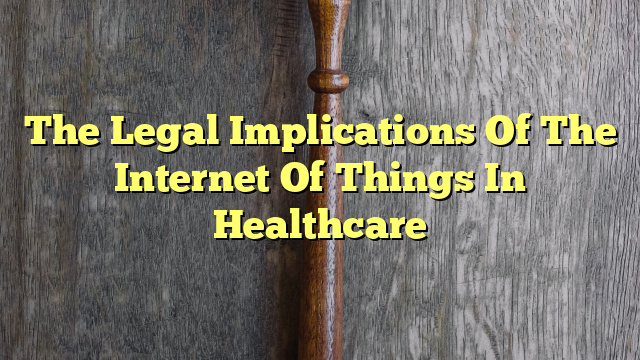Table of Contents
- What are the implications of IoT in healthcare?
- What are the legal issues with Internet of Things IoT?
- What ethical and legal implications exist in healthcare?
- What are ethical implications related to technology access in health care today?
What are the implications of IoT in healthcare?
The Internet of Things (IoT) is changing the way healthcare is delivered. IoT technology, such as wearables and connected medical devices, is allowing healthcare providers to access and analyze patient data in real-time. This data can then be used to inform treatment decisions and improve patient outcomes. In addition, IoT devices are helping providers to monitor patients remotely, reducing the need for in-person visits and saving time and money.
However, the implications of IoT in healthcare go beyond just convenience and cost savings. The use of IoT technology in healthcare can also lead to improved data security, greater efficiency in the delivery of healthcare services, and improved patient engagement.
What are the legal issues with Internet of Things IoT?
The legal implications of IoT in healthcare are still being explored. However, it is clear that there are a number of legal issues that must be considered when using IoT technology in healthcare. These include:
- Data privacy and security: As with any technology, the data collected and stored by IoT devices must be kept secure and private. This means that healthcare providers must ensure that any data collected is encrypted and stored securely. In addition, healthcare providers must ensure that they have the necessary consent from patients to collect and store any data.
- Regulatory compliance: Healthcare providers must ensure that any IoT devices or systems they use are compliant with all applicable laws, regulations, and guidelines. This includes but is not limited to HIPAA, GDPR, and other regulations applicable in their jurisdiction.
- Intellectual property: IoT technology can be subject to intellectual property protections, such as patents and copyrights. Healthcare providers must ensure that they are not infringing on any rights when using IoT technology.
- Liability: Healthcare providers must consider their potential liability when using IoT technology. This includes any potential liability for data breaches, privacy violations, or other issues related to the use of IoT technology.
What ethical and legal implications exist in healthcare?
The ethical and legal implications of IoT in healthcare are closely related. The ethical implications of IoT in healthcare consider the impacts of the technology on patient autonomy, privacy, and data security. These implications must be taken into account when developing healthcare policies and procedures related to the use of IoT technology.
The legal implications of IoT in healthcare are concerned with the legal requirements and responsibilities associated with the use of the technology. This includes ensuring that any data collected is secure, that any intellectual property rights are respected, and that any regulatory requirements are complied with.
What are ethical implications related to technology access in health care today?
The ethical implications of technology access in health care today are concerned with ensuring that all patients have access to the same level of care, regardless of their economic or social status. This includes ensuring that all patients have access to the latest healthcare technologies, including IoT devices and systems.
In addition, healthcare providers must ensure that the use of technology does not lead to disparities in care. For example, healthcare providers must ensure that the use of technology does not lead to disparities in access to healthcare services, such as access to specialists or quality care.
Overall, the ethical implications of technology access in health care today are concerned with ensuring that all patients receive equal access to high-quality healthcare services.

